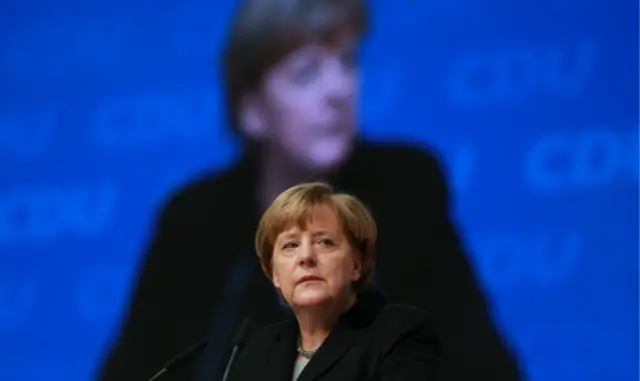German Chancellor Angela Merkel defended on Monday her refugee policy, promising to reduce the refugee influx through effective measures and calling for a sustainable and lasting solution to the current refugee crisis.
In a speech on the opening day of a party congress of her Christian Democratic Union (CDU), Merkel said the refugee crisis - the worst since the Second World War - was "a historic test for Europe," adding that solving the crisis requires not only national efforts, but also measures at the European and international level.
The two-day party conference, opened in the southern German city of Karlsruhe, is regarded as an indicator of how much support Merkel has among her own base.
With nearly one million refugees now registered in government computer systems, the chancellor and CDU leader is facing resistance in her homeland over her stance on refugees, also from her own party. Critics believed that her current policy was inappropriate and demanded a cap on the number of refugees entering Germany.
Defending her famous "We can do it" attitude towards the unprecedented influx of asylum seekers, Merkel promised on Monday to meet the challenge posed by the "huge task" facing Germany. She pledged that her party would lead to realize a clear reduction in the number of refugees entering Germany.
The CDU executive managed to hammer out a resolution on refugees on Sunday despite internal disputes over Merkel's handling of the refugee crisis.
The compromise proposal, which was passed by CDU delegates with a large majority on Monday, states that the party is determined to "noticeably reduce" the influx of refugees through effective measures, but avoids any mention of an upper limit demanded by some of the chancellor's critics.
Merkel made clear that she would further implement the relevant measures that Germany has adopted so far, partially with a hard tone, to make sure that her country won't be overwhelmed by the refugee influx in the long term.
She said Germany, as Europe's economic powerhouse, still has a moral and political duty to continue providing help to the world's most desperate and vulnerable people. The refugees themselves, on the other hand, should also show the willingness to integrate in the German society.
Meanwhile, Merkel pointed out that efforts focused on the European and global level were also needed for a success in regulating and limiting migration.
In this regard, the chancellor called for enhanced cooperation with Turkey in combating human traffickers and improving the living conditions of the refugees staying in the country, more European action to secure the external borders of the Schengen free-movement zone, especially through the establishment of "hotspot" refugee centers in Italy and Greece, as well as solidarity and shared responsibility among EU members in dealing with the crisis, with an aim to establish an unified European asylum system to prevent the abuse of asylum rights.
In addition, Merkel believed it was important to eliminate the root causes of refugee flows by promoting peace and stability in crisis countries such as Syria, Iraq and Afghanistan.
"The refugee crisis is a historic test for Europe, and I want - hopefully, I can say that we all want - that Europe passes this test," Merkel said, adding that she and her country "will do our bit to make sure this happens."
Merkel's speech on Monday, regarded as the "strongest" one on her course in the refugee policy, has greeted with standing ovation and minutes-long applause from CDU members.
German media commentated that with the influx of refugees in Germany now tipping one million, a huge challenge still lies ahead, especially as German society works to integrate its new members. But at least for now, the conservative party seems to be once again united and behind its leader.
 简体中文
简体中文

